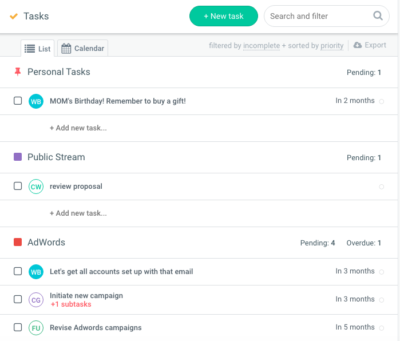Today’s digital marketing ecosystem is overcrowded and highly competitive. To stand out, you need to equip your digital marketing teams with the right set of productivity tools. They will provide notable advances in your teams’ productivity and the faster delivery of your marketing projects.
Here are a few powerful tools and technologies you need to increase the productivity of your digital marketing teams.
Manage Tasks and Improve Collaboration
In digital marketing, seamless and real-time communication between team members is critical. Otherwise, overall team collaboration and performance would suffer. Fortunately, there are many task management tools that can reduce siloes in your organizational culture and help your teams work together.
One such tool is Hibox that serves as an efficient time management tool that lets your team members create new tasks easily, assign them to the right people, and set clear deadlines. Apart from task management, Hibox also provides a private and secure company chat, where they can collaborate easily, share company-wide announcements, and even start video conversations. The tool also offers an AI assistant that will help employees manage their tasks and organize themselves proactively. Above all, it integrates will the crucial tools your teams use, such as Google Drive or Dropbox.

Automate Link Building
According to an SEO agency from Hong Kong, Elevate Digital, guest blogging is still one of the most powerful ways to gain natural backlinks. And, this is not surprising at all, given that backlinks are still one of Google’s most significant ranking factors.
However, the mere process of link prospecting is complex and time-consuming. Namely, your link building team first needs to use Google’s search operators to conduct diverse Google searches and find relevant blogs in your niche. Next, they need to add the links and website data into spreadsheets, as well as analyze the relevancy and quality of the blog and seek a blogger’s contact information.
This is where automating the link prospecting process helps. With link building tools like Dibz, your off-site SEO hackers will be able to conduct automated searches, set clear search criteria, and eliminate low-quality results. The tool takes link prospecting to the next level, as it also serves as an email scraper, meaning that it will automatically collect data for each site you consider relevant and even lets you export your list of link building prospects to PitchBox.
Another great tool link builders should use is Yesware that lets them track whether a blog editor has opened and read their email or simply ignored it. This way, they will know how likely they are to obtain a backlink from that specific website.
Streamline Client Reporting
No matter if you are a B2C/B2B company hiring an in-house marketing team or a digital marketing agency, tracking the success of your digital marketing campaigns is immensely important. However, measuring this process may sound easier than it really is. Namely, you will need to invest in multiple tools to track different segments of your campaigns, such as SEO, PPC, social media marketing, or email marketing.
Monitoring metrics on multiple dashboards, extracting your statistics into Spreadsheets, and analyzing mountains of data manually would eat up a lot of your time. Not to mention that each digital marketing tool you use provides a wide range of features and metrics that are not necessarily relevant to your employer or client. This would only confuse your marketing teams and distract them from the goals they have set.
To streamline your reporting processes, you will need to invest in automated reporting tools. For instance, Reportz allows you to combine the features from different digital marketing tools and observe your most important KPIs from a single, personalized dashboard. You can even combine your SEO, PPC, and social media metrics to get better insights into your campaigns. Most importantly, you can design and standardize reports for each client, make them on-brand, and schedule their delivery automatically.

Improve On-Page Audits
Performing on-page SEO audits is possible, but it takes lots of your technical SEO team’s time. Namely, they would take days to comb through each page on your website, analyze it, and enter data in spreadsheets. Worse yet, no matter how hard they try, there will always be inconsistencies and inaccuracies in the data they collect.
Precisely because of that, you need to equip your technical SEO teams with the right tools and one of them is certainly Screaming Frog. Namely, this amazing SEO spider will audit webpages, focusing on the most important ranking factors, such as internal links, website responsiveness, meta tags, redirects, duplicate content, etc. This way, it will save your team hours of work and help them identify and solve key SEO problems faster.
Keep your Social Media Accounts Consistent
Even though SEO and digital marketing are often seen as two separate digital marketing disciplines, they often intertwine on so many levels. Social networks let you promote your content widely, improve its reach, and drive quality traffic to your website. They even put your content in front of industry influencers, helping you earn authoritative backlinks. That is exactly why I consider social media marketing an inseparable part of SEO.
Now, the major problem your social media professionals face is social media posting consistency. Sharing posts manually across different channels wastes their time and impacts their productivity. This is where you need to invest in social media management tools. You have probably heard of Buffer and Hootsuite, but I would now like to focus on IFTTT, a fully automated social media management tool. With IFTTT, you can post Instagram photos to Facebook or tweet them as native Twitter photos. You can also archive your photos on the cloud and lets you promote your blog content across multiple channels as soon as it goes live.

Harmonize your SEO Tools to Boost Productivity
When building a digital marketing strategy, you will need to invest in a wide array of tools, including the ones mentioned above. However, tracing your data across multiple dashboards can be confusing. To increase your teams’ productivity and save time, you will first need to find a way to harmonize your tools. Map out your critical digital marketing processes, assess the effectiveness of your SEO tools, and implement automation wherever possible. Check out some free SEO tools here.
I hope this will help you increase the productivity of your digital marketing teams. If you have any questions or suggestions, we are listening!




